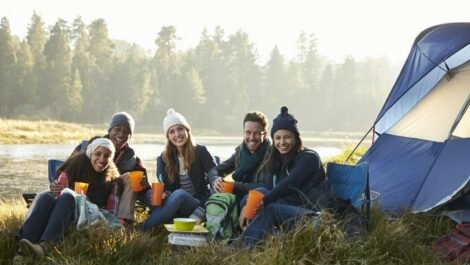
The Ultimate Guide for Camping in the Winter
November 28, 2023 | Lifestyle
Summer’s over, and the days are getting shorter and colder, but autumn and winter are still a great time to go camping. Winter camping offers a lot of perks, too. It’s invigorating, and there are fewer crowds (and bugs!), giving you an opportunity to enjoy a different side of mother nature.
Camping outdoors in the snow requires more preparation than fair-weather camping. However, experienced campers should be ready to adapt to the extra challenges posed by colder temperatures, snowy terrain, and unpredictable weather conditions.
Winter camping is a great way to enjoy the outdoors during the off-season. This guide provides an overview of the essential cold-weather gear, including tents, sleeping bags and pads, warm clothing, and other accessories.
Camping in the Winter in a Tent
When looking for tents for camping in the winter, remember that a geodesic or dome-shaped tent will provide more stability and resistance to wind and snow than a tunnel or cabin-shaped tent. 4-season tents are popular among winter campers because they are engineered to withstand harsh weather such as snow, wind, and cold temperatures. The tent fabric used in 4-season tents is thicker and more durable than other tents and is designed to resist tearing and provide better insulation against the cold.
If it’s extraordinarily cold where you are camping, look for a durable tent with a snow skirt or snow flaps at the base, which can be buried in snow to seal the tent and provide extra insulation. This feature helps in keeping the tent warmer in winter conditions.
Sleeping Bags and Pads
Use a high-quality sleeping bag suitable for low temperatures. Consider a down-filled sleeping bag with a remarkable warmth-to-weight ratio if camping in the snow. Mummy-style bags are a good choice and go with a bag with a temperature rating lower than the expected nighttime temperatures. It’s also highly recommended to invest in a sleeping pad, which provides a barrier between you and the frozen ground.
Research reveals that up to 45 percent of our body heat can be lost through the head and neck. So it’s crucial to have a snug-fitting wool or fleece hat that covers your ears and either a scarf, fleece neck gaiter, or both. Also, Consider bringing hand warmers to put inside your gloves.
A high-quality down or synthetic fiber jacket provides warmth by trapping body heat. Waterproof and windproof outer layers will help keep you dry and warm in windy conditions. If you snowboard or ski, you probably have the appropriate winter clothes and accessories. Even so, remember your base layers; they’re designed to regulate your body temperature and keep you dry when you sweat.
Don’t forget your feet! Warm, moisture-wicking socks paired with waterproof and insulated boots are essential to keep your toes dry and warm. Ensure your winter boots have good traction to prevent slipping on icy surfaces. Gaiters are a must-have. They’re worn over your lower legs and boots to keep snow from getting inside your shoes.
Sun Protection
Sunscreen and sunglasses are winter camping gear staples. Remember, even on overcast days, UV rays can penetrate clouds, so protecting your skin and eyes year-round is essential, especially in the winter when the sunlight reflects off the snow. Wear sunglasses that provide 100% UV protection to shield your eyes from the sun’s glare on the snow.
Look for wraparound sunglass styles that help prevent light from entering through the sides. Also, bring a wide-brimmed hat that will shade your face, neck, and ears if you’re camping during springtime in warmer weather.
Extra Food and Water
Whether hiking, camping, or backpacking, always be sure some food items you pack don’t require cooking. While deciding on a winter camping menu, plan for easy-to-cook meals and high-protein snacks. Things like extra energy bars, nuts, dried fruits, or jerky are good choices.
Always pack at least an extra day’s worth of food just in case you want to stay an additional day or the unplanned happens, like bad weather. Freeze-dried food is a good choice here because it is small and lightweight. Moreover, you can get every type of food, from simple to gourmet meals.
Cooking and Heating Equipment

Choose a portable camping stove you’d like to cook on to create an enjoyable culinary experience. Sporting goods stores like REI and RV World carry a variety of compact propane or butane stoves and will have someone on hand to answer your questions.
Pack a set of durable cookware, including a lightweight pot, frying pan, and kettle to warm water for cleaning dishes. Remember essential cooking utensils like a spatula, tongs, and a long-handled spoon for stirring. To simplify the cleaning process, bring biodegradable soap and a scrubber.
Lighting
Days are shorter in winter, so carry reliable light sources, such as LED lanterns for your campsite. Having a headlamp to keep your hands free and trips to the restroom at night is also a good idea. Choose one that offers a bright light and is compatible with rechargeable and AAA batteries and bring extra batteries.
Camping in Winter Essentials
Navigation Tools: Winter conditions can make trails hard to follow. Bring a map, compass, and GPS device to navigate and know how to use them.
First Aid Kit: Include supplies specific to cold weather injuries, such as hand warmers, blister treatment, and emergency thermal blankets.
Emergency Supplies: Pack a whistle, fire-starting materials, a multi-tool, and a fully charged cell phone with emergency contacts saved.
You can also consider camping in an RV if you aren’t brave enough to try tent camping in the winter. Start by winterizing your RV to protect the plumbing from freezing. Insulate all the windows and doors to keep the interior warm and bring some portable heaters. Plan your route carefully, sticking to well-maintained roads and checking weather conditions frequently. Pack all the essentials we previously mentioned in this blog and you’re bound to have a successful winter camping experience!
In Summary
Planning is essential for a successful winter camping trip. Be sure to research the area you will be camping in and check the weather forecast before you go. Pack accordingly and leave plenty of time to set up camp before dark.
Winter camping can be a great way to experience the beauty of nature and challenge yourself in a new way. With proper planning and preparation, you can have a safe and enjoyable winter camping experience.
Winter Storage Solutions Designed with Your Comfort in Mind
Whether you are in a city that experiences several inches of snow and rain every year, the winter climate can present some unique challenges when moving, decluttering, or storing seasonal gear. With facilities in states that experience those classic cold winters, we’ve got an option for you!
Our state-of-the-art storage facilities are 100% climate-controlled, with many offering spacious drive-in loading bays to keep you and your belongings out of the elements. At Metro Self Storage, you’ll always find a friendly storage team ready to answer all your questions and help you determine the best storage solution to meet your needs. See how easy it is to reserve your unit online today!



